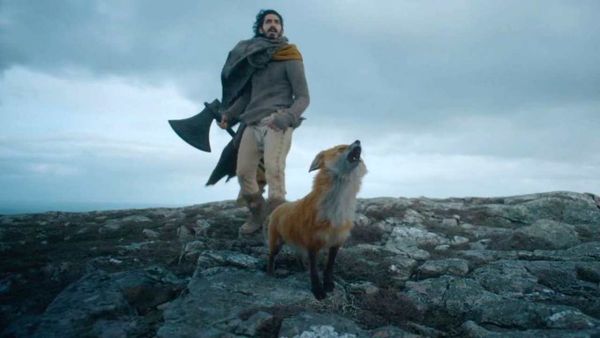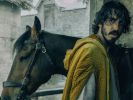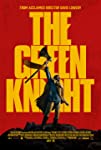Eye For Film >> Movies >> The Green Knight (2021) Film Review
The Green Knight
Reviewed by: Jennie Kermode

Everyone likes to imagine that they are the author of their own story. A great story might confer a kind of immortality, sustained through generations, as the tale of Sir Gawain And The Green Knight has been told and retold for over seven hundred years. But to live, one must change; and just like people, stories take on different forms. David Lowery’s astonishing cinematic vision is both the finest piece of Arthurian work since Excalibur and a reworking which could not be more pertinent today.
Gawain (Dev Patel) is the privileged young nephew of the king, a man widely believed to be destined for greatness, yet he feels himself poor in the absence of any story of his own. In a court full of legendary men, he is a nobody, a mere slip of a thing first seen stumbling round a brothel looking for lost boots. He’s careless, unreliable, inconsiderate, self-centred and yet somehow quite adorable - as Nicol Williams’ Merlin said, “It’s easy to love folly in a child.” But something is about to happen which will test not only Gawain himself but the whole Arthurian mission.

As most viewers will be aware, it begins with a game. At Christmastime (a magical time to the 14th Century mind, and one around which Christian and Pagan traditions were in lively competition) a Green Knight comes to Camelot. His name has often been ascribed to a mistranslation but Lowery takes his greenness seriously, decking him out in a way which recalls any number of powerful forest spirits in British myths and reminds us of his possible faerie origins. Like an emissary from Tir-na-Nog playfully acknowledging the season, he suggests a game: any one of Arthur’s knights may strike a blow against him provided that they agree, one year hence, to travel to his green chapel and receive the same blow in return. Eager for attention and thinking he’s found a way to beat the system, young Gawain steps forward and chops off his head. The court falls silent. The Green Knight picks up his head, reminds Gawain of his vow, and leaves.
For a year, Gawain lives his dream. Important men talk about him. Women like him even more than they did before. He never has to buy his own drinks. But all too soon, winter comes, and with it a question. Will Gawain honour his vow? Just as he has drifted through life so far, he somehow drifts onto a horse, out through the gates and onto the road, everybody else seeming to carry his thoughts and emotions for him. He wears a rich velvet cloak the colour of the gorse along the roadside. At his waist is a green girdle, magical protection against harm – a gift from his mum. Of course, he’s quite capable of getting into scrapes whether protected or not.
This is a story which has often been described as an exploration of what happens when the high ideals of chivalry come into contact with the realities of human nature, or when Christ-like ideals meet the ordinary Christian. Modern viewers will immediately wonder what Gawain is doing on the road – why, at each stage, he fails to turn back; why he keeps looking for a green chapel when instead he might look for a nice pub and rest out the winter and then build a new life for himself somewhere else. He is often advised to turn back. Even a wild animal will beseech him to see sense. But that’s the crux of it. This is about a choice not just between the Pagan and the Christian but between wildness and civilisation. Through the telling, Lowery asks us all what kind of future it is that we seek.
As one would expect in a chivalric romance of this sort, there are many strange encounters along the way. This sheltered youth is in danger enough from wily peasants. He must also reckon with an undead saint, a generous and seductive older couple, and even mysterious giants who seem to be inviting him to break the fourth wall and hide within the audience. This is a wild world where rules can only exist if continually reaffirmed by belief. It’s a coming of age story which threatens to withhold the reward of growing older; but doesn’t death come for us all, sooner or later, no matter what choices we make?
That green girdle betokens a film full of circles: the arena in which that first blow is struck; the world which Gawain seems to ride around, the changing seasons, a story structure which keeps bringing him back to the start. Rich, deep greens suffuse the film, along with Prussian blue and cerulean gowns, antique gold and saffron highlights everywhere. Any number of the film’s frames belong in frames, fit to adorn palace walls. It’s a literary, philosophical tale which some viewers will struggle with just as Gawain himself does, but those luscious colours will hold many eyes nonetheless. Andrew Droz Palermo – another youngster, who cut his teeth on a V/H/S short – transforms remote Irish landscapes into a mythic Britain that is vast and daunting, and the orchestral score coils around it like a snake.
In this majestic setting, heavy with symbolic imagery, Lowery brings Gawain’s tale to a conclusion seven centuries in the making. It’s a daring piece of work, and an invitation to step out of the circle, to walk a new path, to write our own story afresh.
Reviewed on: 24 Sep 2021
















